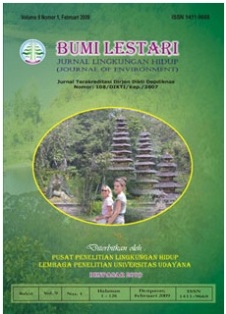HORTICULTURAL, MEDICINAL AND CEREMONIAL PLANTS IN PETIGA VILLAGE, TABANAN BALI PROVINCE
Abstract
Sustainable development is a must for Bali. It is due to the fact that one of the negative impact of development is the change of the land use from agriculture into other functions. As a result most of medicinal plants will be extinct. In another hand there is a trend of people to plant horticultures in their house yards. The main issue: is there any relationship between horticulture and sustainable development? In answering it, a field study was conducted in Petiga Village, Tabanan, Bali Province. Observation and interview were carried out to respondents consisted of five Balinese farmers who nurse cultivate the horticultural plants for their daily activities. Results show that: 1) there are about 159kinds of plant totally used as horticultural plants; 2) amongst those plants, about 67 plants belong to the medicinal plants and 80 plants belong to ceremonial plants; 3) number of horticultural plants in every house sampled ranged from 63-94 kinds; 4) the popularity of any horticultural plant is affected by the market’s demand. The conclusion which could be drawn is that the medicinal plants as well as the ceremonial plants are used for horticultural plants. It is due to their wonderful colors, nice stems, flowers or leaves, special odors, economical values and magical values as well. Horticulture could be used as a strategy for preservation and conservation program of the medicinal plants in Bali. It is recommended that for the sustainability, all medicinal plants which exist in Bali should be invented and planted in a form of medicinal plant park.
Downloads
Keywords
Authors who publish with this journal agree to the following terms:
- All articles published by Bumi Lestari Journal of Environment and Environmental Reseach Center Udayana University are made available under an open access license worldwide immediately. This means everyone has free and unlimited access to the full-text of all articles published in Bumi Lestari Journal of Environment, and everyone is free to re-use the published material given proper accreditation/citation of the original publication. Open access publication is supported by authors' institutes or research funding agency by payment of a comparatively article processing charge for accepted articles (See Author Fees). Bumi Lestari Journal of Environment and Environmental Reseach Center Udayana University publish articles under the Creative Commons Attribution License.
- Authors are able to enter into separate, additional contractual arrangements for the non-exclusive distribution of the journal's published version of the work (e.g., post it to an institutional repository or publish it in a book), with an acknowledgement of its initial publication in this journal.
- Authors are permitted and encouraged to post their work online (e.g., in institutional repositories or on their website) prior to and during the submission process, as it can lead to productive exchanges, as well as earlier and greater citation of published work (See The Effect of Open Access).





